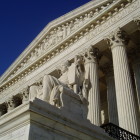
Growing up Behind Bars: Q&A with Yusef Salaam
|
Yusef Salaam was one of the five teenagers falsely convicted in the brutal rape of a white woman in Central Park in 1989. The convictions were overturned in 2002, when a serial rapist confessed to the crime, but Salaam had already served his full 5½-year term in prison. Recently, I had the opportunity to interview Salaam about his experience and the impact it had on his life. In person, Salaam carries a dignified, purposeful, and positive aura. He seems to be using his situation as an opportunity to help youth by sharing his message with them.


